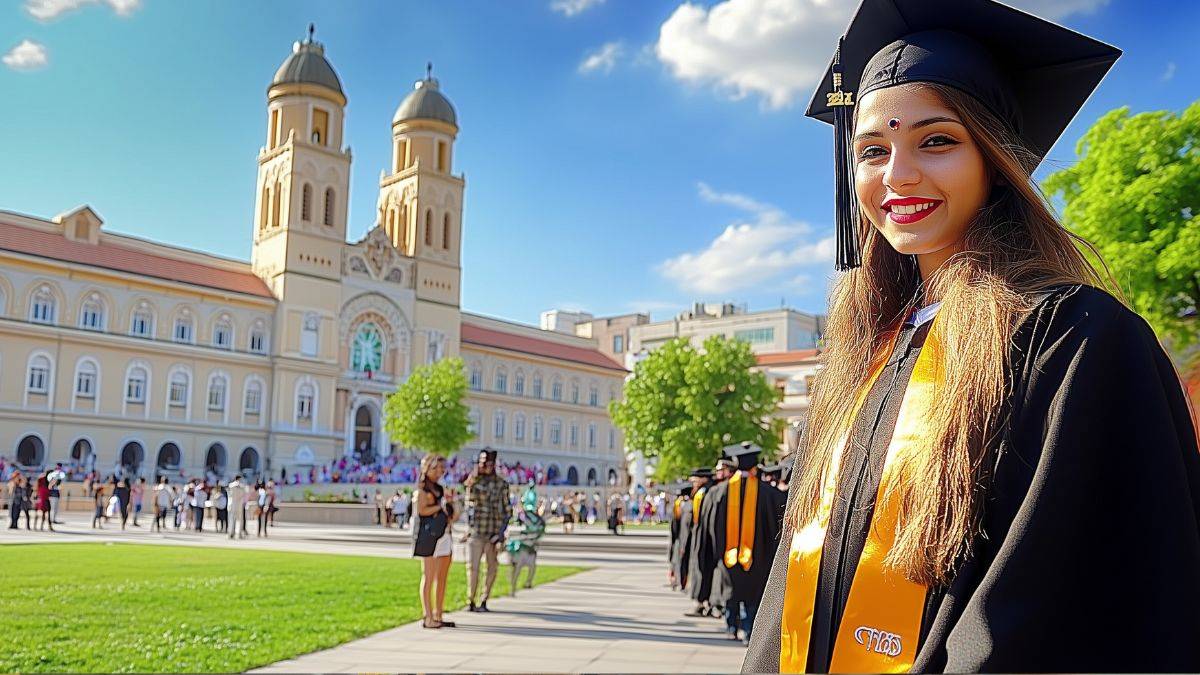Top 10 Notable Alumni of Ludwig Maximilian University of Munich (LMU)
Ludwig Maximilian University of Munich has given many notable alumni across diverse fields. it is also known as the University of Munich and is the sixth oldest university in Germany that is still in continuous operation.
Ludwig Maximilian University of Munich (LMU Munich) is one of the oldest and most respected universities in Europe. It is also one of the top public universities in Germany. LUM Munich ranks at #59 in QS World University Rankings 2025.
LMU Munich alumni list includes influential figures across fields like science, literature, philosophy, movies and politics. Arnold Schwarzenegger, Max Planck, Werner Heisenberg, Otto Hahn are some top alumni of Ludwig Maximilian University of Munich.
Ludwig Maximilian University of Munich boasts its vibrant community of 54,616 students, out of which over 11,000 are international students. This university has also earned the title "University of Excellence". this article contains list of top ten notable alumni who studied at LMU Munich, along with what they are known for and more.
- Top 10 Notable Alumni of Ludwig Maximilian University of Munich
- 1. Max Planck
- 2. Pope Benedict XVI
- 3. Werner Heisenberg
- 4. Otto Hahn
- 5. Thomas Mann
Top 10 Notable Alumni of Ludwig Maximilian University of Munich
| Name |
Profession |
|---|---|
| Max Planck |
Theoretical Physicist - developed Quantum Theory |
| Pope Benedict XVI |
Head of the Catholic Church (2005–2013) |
| Werner Heisenberg |
Nobel prize winner Theoretical Physicist |
| Otto Hahn |
Chemist - Discovered Nuclear Fission |
| Thomas Mann |
Novelist - Nobel Prize in Literature |
| Sir Muhammad Iqbal |
Philosopher, Poet, Politician |
| Rudolf Hess |
Nazi Official, Adolf Hitler's Deputy |
| Klaus von Klitzing |
Physicist - discovered the Quantum Hall Effect |
| Arnold Schwarzenegger |
Actor, Former Bodybuilder, Politician and Former Governor of California |
| Wilhelm Conrad Röntgen |
Physicist - discovered X-rays |
1. Max Planck
Max Planck was a theoretical physicist - best known for his role in the development of quantum theory. The theory changed how we understand tiny particles like atoms. In 1900, Planck discovered that energy is not continuous but comes in small packets called "quanta." This idea helped scientists understand how energy works at a very small scale. The Max Planck Society that supports scientific research is named after him.
Predict your IELTS, TOEFL, and PTE in just 4 steps!
Max Planck's achievements-
- Awarded the Nobel Prize in Physics in 1918.
- Developed Planck's Law which describes the spectral density of electromagnetic radiation emitted by a black body in thermal equilibrium
- Founded the Max Planck Society
2. Pope Benedict XVI
Pope Benedict XVI remained the head of the Catholic Church from 2005 to 2013. He studied theology and philosophy at LMU Munich. Before becoming pope, he was a respected theologian and wrote many important books about faith. Pope Benedict XVI made history by resigning in 2013. This made him the first pope to do so in almost 600 years.
3. Werner Heisenberg
Werner Heisenberg discovered the Uncertainty Principle which states that we cannot calculate both the position and speed of a particle at the same time. Werner Heisenberg received Nobel Prize in Physics in 1932.
Werner Heisenberg's achievements-
- Contributed to development of matrix mechanics and quantum field theory
- laid the foundation of modern physics
4. Otto Hahn
Otto Hahn discovered nuclear fission - the mechanism behind the energy source of the atomic bomb. Otto Hahn won the Nobel Prize in Chemistry for this discovery in 1944.
5. Thomas Mann
Thomas Mann was a very popular writer who questioned life. He wrote about how people think, feel, and made difficult choices of choosing right or wrong.
He wrote his books a long time ago; people are still reading them today because they teach us so much about how humans behave.
Some of his famous works include -
- Buddenbrooks
- The Magic Mountain
- Death in Venice
In 1929 he even won the Nobel Prize for Literature
Yes, Schiller International University Germany accepts IELTS exam as a part of English language requirement. SIU Germany offers admissions for international students on a rolling basis. International students whose native language is not English, must submit proof of English proficiency at SIU Germany. Schiller International University Germany also accepts English language test such as PTE, TOEFL, Duolingo, and more. International students must meet the minimum English test score requirement at SIU Germany that are listed below
Test | UG | PG |
|---|---|---|
TOEFL iBT | Minimum score of 80 | Minimum score of 89 |
IELTS | Minimum score of 6.0 | Minimum score of 6.0 (MBA and MBA International Business require 6.5 or equivalent) |
Duolingo | Minimum score of 95 | Minimum score of 105 |
PTE | GSE score of 59 or higher | GSE score of 67 or higher |
The document requirements at the IU International University of Applied Science are as per the programs and the level of course. Some of the programs require work experience, whereas some require interviews, and few of the programs require both, therefore students need to check the documents and eligibility requirements of the programme before applying. However, the general requirements at the university are mentioned below:
Academic transcripts and records.
Proof of English language test scores.
Work experience (if applicable).
CV or Resume.'
Health insurance.
Copy of passport.
Recent passport-size photographs and others.



Yes, 320 is a very strong score for Germany. Most German universities look for a score around 300 to 310. If you have 320, you are well above average. It will help you get into top schools like TU Munich or RWTH Aachen. Focus more on the Quant score for engineering courses.